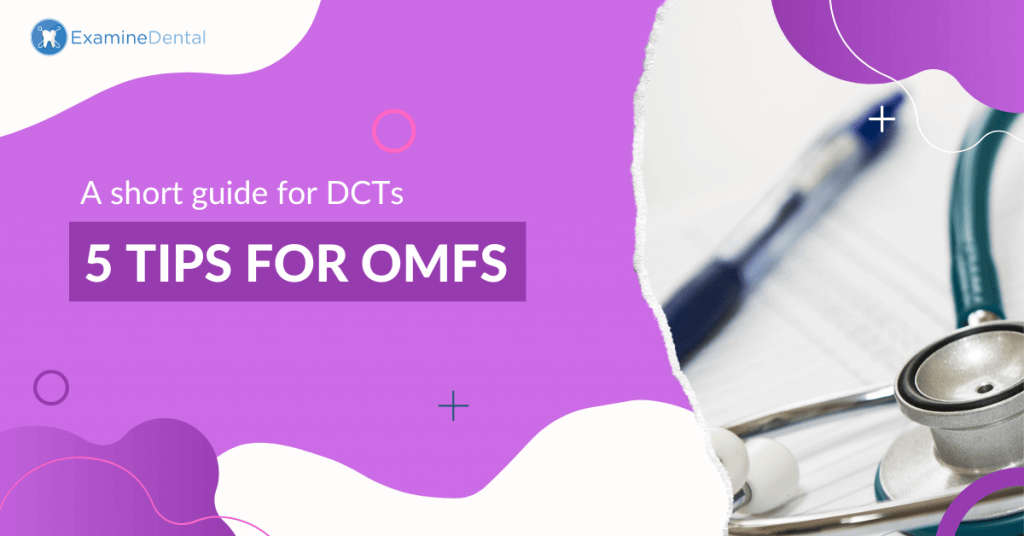
5 tips for OMFS – Guide for DCTs
Contents
ToggleFirst of all, congratulations on securing your Dental Core Training (DCT) post! No matter the outcome, I guarantee you that your rotation in Oral Maxillofacial Surgery (OMFS) will be memorable and filled with learning opportunities. It will be challenging but rewarding and you will come out a better person and dentist for it. That being said, here is a guide for DCTs about to embark on a year of OMFS with a few tips and tricks for the budding dentist fresh out of foundation year:
1. Plan your year effectively
One of the main differences between Foundation Dentistry (FD) and DCT is that no one is going to chase you for your portfolio. You are in control of your learning, your projects and your career planning. Just as a ballpark, your Interim of Competency progression (IRCP) – takes place sometime March and your FRCP usually takes place in late June/early July. Like FD, you will be expected to have hit certain milestones (Supervised Learning Events) within these time frames so it is important you crack on early to start accumulating them.
We are entitled to 30 days of Study Leave but we need to plan this around our on call shifts, annual leave and work together with fellow DCTs to ensure that there is cover for the department. The full list of mandatory, recommended and optional study days are on the COPDEND website and I strongly suggest you have a read through of the DCT guide prior to starting.
If you are starting an audit or quality improvement project, aim to start early as they take time (e.g. proposals getting approvals etc) especially if you want to complete a full cycle. Take advantage of the learning environment the hospital provides you and present your audits/projects at department meetings, study days and relevant dental societies – these add to your CV.
2. Master the basics in surgical dentistry first
You are definitely going to feel out of your depth and it’s okay! Even Consultants do not always get the right diagnosis 100% of the time. You will be confronted with patients with complex medical histories, no formal diagnoses and sometimes confusing problems which may or may not even be head and neck related. Remember where you are starting – as a junior dentist fresh out of FD. Normalise asking questions, making mistakes BUT learning from them and always escalate to a senior if unsure.
A lot of us will not have had much surgical extractions or suturing practice in FD so start with the basics e.g. surgical extractions of buried roots or 6s, simple interrupted sutures etc before doing impacted 8s or raising full thickness flaps.
Your experience will be dictated by your keenness to learn. Have some free time? Observe a staff grade or consultant clinic! I promise you will learn so much more about TMD, facial pains and oral medicine – the stuff you learn about in textbooks in dental school in front of you to do case reports/document.
3. Communicate as part of a wider team
You are no longer captain of the ship! Being in hospital means you will manage a wide range of cases from genetic dental abnormalities, cancer to abscesses to facial fractures and lacerations. You might be called to the ward one minute and then to A+E in another to deal with a new facial trauma patient. All of this requires multidisciplinary input and proper communication with different departments which is essential to ensuring efficiency in treatment planning and to ensure the patient is seen by the right people. Think bigger than the four walls of the dental room, you will encounter the histopathologists (for your biopsies), radiologists (your x-rays and CT scans), clinical oncologists, SALT team and even dieticians for your head and neck patients. The list goes on!
4. Build your CV
This year will be a good time to complete one or both parts of the MFDS examination. If you are thinking about specialising now would be a good time to explore the person specifications for the speciality posts, work on them and expand your portfolio. Importantly, please record whatever you have done, observed, assisted/performed in your e-surgical logbook (access is free and you can upload this in your other HEE dental e-portfolio)
Your DCT year will usually provide you with lots of opportunities to present posters and write publications. Take advantage of this and be keen to get involved. These will all contribute to your portfolio and CV.
5. Strike a balance
This phrase says it all. You need the yin to the yang. It is easy to be carried away by the job so find outlets – be it exercise, family or friends. Burn out is increasingly common amongst DCTs so pace yourself. You may find that being in hospital enjoyable with its dynamism or you may find that hospital is not for you and that’s OK! You have a whole year to look forward to so make the best out of it!
Summary
Your year in OMFS is going to be amazing but you need to plan ahead to stop getting overwhelmed. Be keen and take every opportunity that you can to get involved – you may not get the chance again!
If you are thinking about doing the MFDS exam during your DCT year, we are always striving to help candidates pass. You can access hundreds of up-to-date, evidence-based MFDS questions and answers to help you prepare for the exam. ExamineDental is the best place to help you prepare for this exam – we want to support you all the way!
